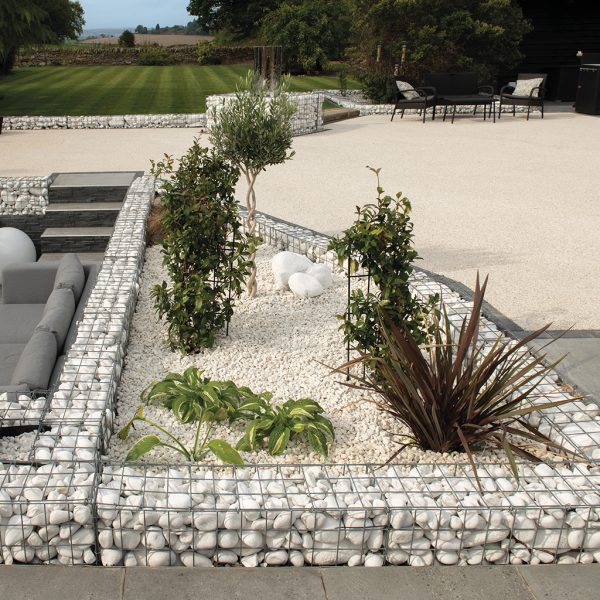
Is block paving permeable?
Standard concrete blocks themselves aren’t permeable. What makes a driveway ‘permeable’ is the system.
Blocks are laid with enlarged, clean-stone joints over an open-graded sub-base, so rainwater passes between the blocks, into the storage layer, and then either soaks away or is released slowly as part of a Sustainable Drainage Systems design (SuDS).
For most UK front gardens, you don’t need planning permission for areas over 5 m² if you use a permeable surface (or drain run-off to a permeable area on your plot). Traditional, impermeable surfacing over that size usually does need permission.
What do we mean by permeable?
In SuDS language, ‘pervious’ is the umbrella term for hard surfaces that let rainwater through. There are then two other sub-categories:
- Porous surfaces: Allow water to pass through the material across the entire surface.
- Permeable surfaces: Made of materials that are not themselves porous, but they include voids/joints, so that water can pass between the units and into the layers below.
Some examples of porous materials include asphalt, porous concrete and some resin-bound systems. These continuous materials drain through their internal voids into a free-draining sub-base.
Permeable block paving works differently. The concrete or clay blocks are typically ‘impervious’, as in the permeability comes from wider, clean-stone-filled joints and an open-graded sub-base beneath.
Rain falls on the surface, drops into the joints, then soaks away or is temporarily stored and released as part of the pavement system.
So, when we say a driveway is ‘permeable’, we’re talking about the whole pavement build-up (including the surface, joints, bedding and sub-base), not just the blocks on top.
How permeable block paving works
Surface
Permeable driveways use standard-looking concrete or clay blocks, but with enlarged joints.
The blocks look ‘normal’, and yet the joints are wider and filled with stone. Raindrops fall through these gaps rather than trying to go through the blocks themselves.
Bedding and sub-base
Under the blocks sits a thin laying course and then a deep layer of open, chunky stone.
The bedding creates lots of voids to store water and move it around until it can soak away or be released in a controlled way.
Drainage strategy
There are three common ways to run a permeable driveway:
- Full infiltration (Type A): everything soaks into the ground.
- Partial infiltration (Type B): some soaks in; the rest leaves via a pipe.
- No infiltration/attenuation (Type C): the sub-base is lined to form a tank, and water is released slowly through an outlet.
To summarise: water goes through the joints, into a free-draining stone layer, then either soaks away or is released slowly.
UK rules & planning (in plain English)
The brief answer to ‘Is block paving permeable?’ is yes, some, but not all. Here’s more information on the UK’s guidelines, split by nation:
England (front gardens and driveways)
- No planning permission if the surface is permeable (e.g., permeable concrete block paving) or if run-off is directed to a permeable area within your plot (e.g., a lawn, rain garden).
- If you want an impermeable surface over 5 m² in a front garden, you do need planning permission.
- These allowances apply to houses only. They don’t automatically apply to flats/maisonettes and can be removed locally.
Wales
- For front gardens the rule is the same in practice: use permeable/porous materials or drain run-off to a permeable area. The Welsh Planning Portal says that minor repairs up to 5 m² can be replaced like-for-like.
Scotland
- Laying a hard surface at a house is usually permitted development if it meets the rules (e.g., appropriate drainage), but there are restrictions (listed buildings, some conservation areas, etc.).
Northern Ireland
- Councils apply the same practical test on front gardens: if the area exceeds 5 m² it must be porous/permeable or drain to a permeable area within your curtilage (or else you’ll need permission).
Do you need natural stone paving? Shop with Ovation Landscaping!
Permeable paving systems are incredibly commonplace in driveways, patios, courtyards and garden paths. For domestic landscaping projects, they keep your home looking sharp and puddle-free.
So, if you’re ready to construct a compliant, low-maintenance finish that lasts, work with Ovation Landscaping. As your local supplier of top-quality paving, it’s our job to deliver on quality, and our hard-wearing garden slabs do exactly that.
You’ll find products like natural stone paving, Indian sandstone paving and decorative aggregates, all for incredible prices.